Funny Numb Feeling on One Leg at Night
Disclaimer - Nothing on this website is intended to be a substitute for professional medical advice, diagnosis, or treatment... Read More Here .
When we go to bed it's easy to assume that we drift off to sleep and there's a clear distinction between our conscious and unconscious states as we slip into dreamland. However, the brain undergoes a shutdown process as we enter sleep mode, and if we have poor sleep hygiene, acute stress, or chemical imbalances, we could experience brainwave dysregulation. As a result, we might experience odd sensations at bedtime.
One of our resident medical experts, Dr. Russell-Chapin, co-director for the Center for Collaborative Brain Research, explains, "when we go to sleep, if the brain is regulated and healthy, our brains should be using the right brainwave for the right task at the right time. When healthy, the brain will often go from beta to alpha to theta to delta. If not, we [develop] these unique sleep disorders."
Weird Feelings When Trying to Fall Asleep
Breathing Difficulties
Difficulty breathing when drifting off to sleep isn't entirely uncommon. Central sleep apnea is when your brain doesn't transmit the proper signals to the muscles that control your breath[1]. Sometimes you may feel tightness in your chest, while other times it could feel like you're choking. It may seem like there's something caught in the back of your throat or your mouth has become excessively dry.
Get More Info: Sleep-Related Breathing Disorders
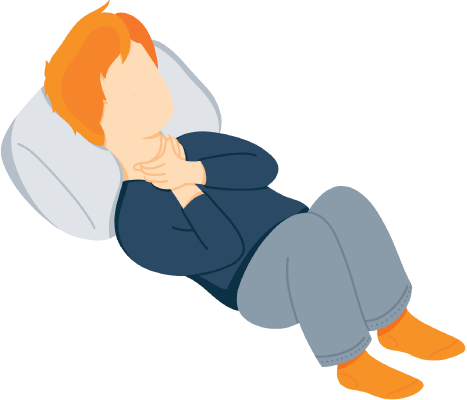
Sinking, Dropping, or Falling
This feeling is particularly scary and jars you from the brink of sleep into being wide awake. Usually, you'll be jolted awake by the sensation that you're dropping off a cliff, or you've just had a fall and are about to experience a painful landing.
The term for this is sleep myoclonus, or hypnic myoclonus, and occurs when your brain is shifting from one sleep phase to another. The physical jerks that happen as a result are referred to as hypnagogic jerks, and they most often appear during the light stage of sleep right as you're drifting off[2].
A Throbbing Headache
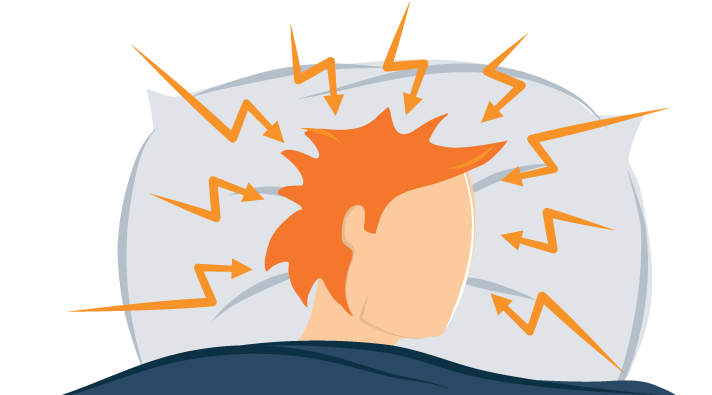
Hypnic headaches are rare, however, they are characterized by frequent headaches that only occur during sleep. They're sometimes referred to as "alarm clock" headaches due to the fact they occur at night and jolt a sleeper awake. They can last anywhere from a few minutes to a few hours, and can significantly impair your ability to rest[3].
A Sense of Panic or Worry
Nocturnal panic attacks or worry as you're falling asleep often occur with no clear trigger, but they can awaken you suddenly. Similar to daytime panic attacks, you could experience a racing heartbeat, sweating, or hyperventilation. While they're extremely uncomfortable and scary, they are typically not dangerous[4].
Itchy Sensations
As we fall asleep, our brain and body are in constant communication as shutdown mode ensues. Itching during rest periods can present as symptoms to possible dermatological diseases, or as a parasomnia (sleep disorder). Few studies have been done about this issue and while recordings have been made observing sleep fragmentation, skin injury, intermittent awakenings, scars, and keloid formation, the cause (and potential treatment) remains speculative[5].
Moving Quickly
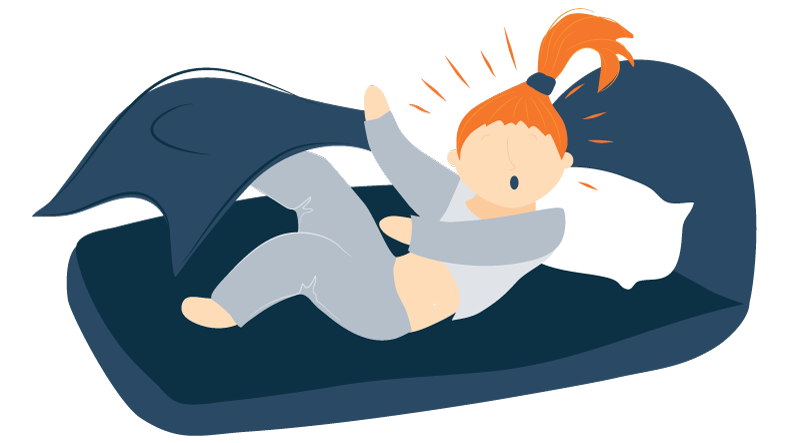
This involuntary jerking is often related to prescription medications, vitamin deficiency, or restless leg syndrome, which is not usually serious. Often, you'll get these twitching sensations when you're experiencing sleep deprivation. RLS (restless leg syndrome) is considered a sleep disorder so your doctor could help. The condition could even be in response to some medications[6].
Brain Zaps
These are also referred to as shocks, brain shivers, or electrical shocks. They're often described as a jolt or a "buzz in the head." They may be experienced in conjunction with flashes of bright light, vertigo, nausea, throat tension, or tinnitus. They are often observed upon the discontinuation of antidepressants[7], so going off this type of medication is important to do under the guidance of a medical professional.
What Causes These Feelings?
Anxiety
Heart palpitations, sweating, trembling, and shortness of breath are all symptoms of an anxiety attack. There are other signs as well, but these are a few of the most common. Naturally, if you're in the throes of a panic attack while you're going to bed, it's going to keep you awake.
Sleeping Disorder
You may be suffering from a sleeping disorder that's causing odd feelings to occur while you're trying to fall asleep. Sleep apnea could cause shortness of breath, while restless leg syndrome could cause twitching and movement. Another condition, exploding head syndrome, could be responsible for your brain zaps.
The good news is that addressing the source of the sleep disorder could make these issues go away.
Find Out More: The Most Common Sleep Disorders
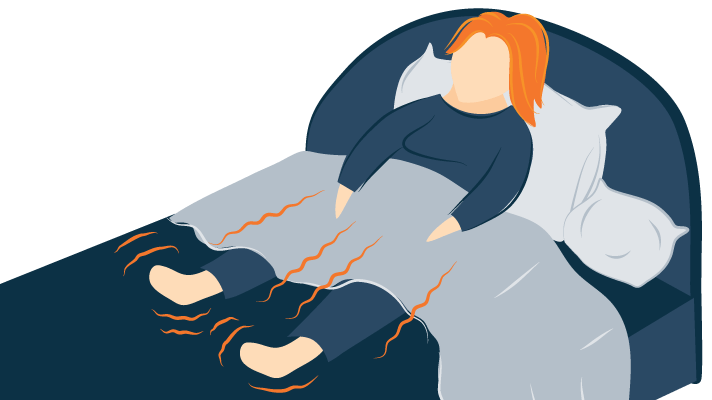
Sleep Deprivation
Whether you're on an unconventional schedule or you've got insomnia, sleep deprivation could trigger all sorts of unexpected consequences, including all of the weird feelings described above. When we don't get the shuteye that we need on a nightly basis, our brains begin to rewire themselves and produce hormones and chemicals at levels not designed for long-term equilibrium[8].
Read More: Surprising Link Between Sleep Deprivation & Psychosis
Sleeping Environment
When you're in an unfamiliar place, like a hotel or friend's house, your body is on high alert and could experience levels of anxiety that could trigger weird feelings and electrical head shocks. If you tend to experience this phenomenon when you're in a strange room, try traveling with something that reminds you of your bedroom at home, like a pillow or familiar blanket, to help ease your mind.
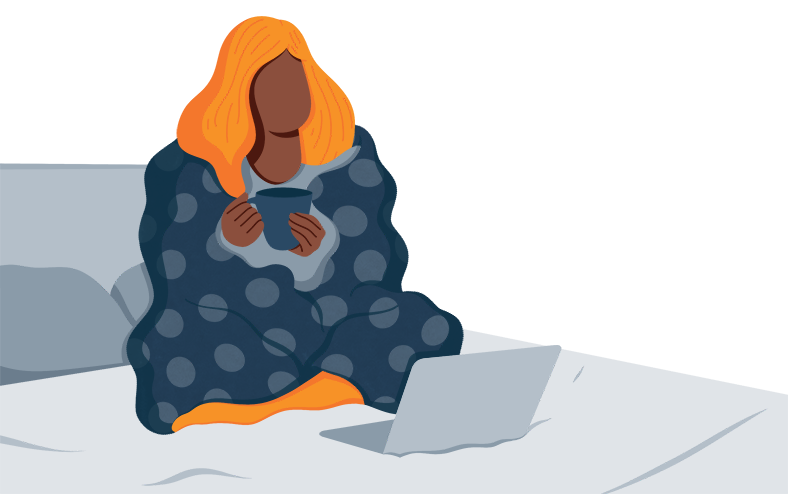
Illnesses
Some illnesses and parasites could be responsible. Lyme disease could be one of the culprits, and once it crosses into the brain could be responsible for a host of sleep issues like insomnia, hallucinogenic dreams, and brain zaps.
What Causes Brain Zaps?
One of the primary causes is withdrawal from medications that regulate serotonin and GABA levels in the brain. So, if you've recently stopped taking an antidepressant, benzodiazepines (for muscle relaxation and anxiety), MDMA (also known as ecstasy), or Adderall (for ADD and ADHD), then you are more likely to experience these zaps.
You probably already know that serotonin is a happiness and sleep chemical, but you might not have heard of GABA before reading this article. It stands for gamma-aminobutyric acid, and its role in the brain is to "calm" activity in the brain. It's believed that low or insufficient levels of GABA could cause a mild (not threatening) seizure that is, in reality, a brain zap.
How to Reduce Nighttime Anxiety
Identify Your Worries
Since anxiety is a known trigger, make an effort to reduce the amount that you worry, especially before bed. Think about what's causing you to feel this way and write down ideas for solutions.
Journaling, meditation, and exercise are all great anxiety management tools. Even a short walk around the block alone could make a significant difference in your mood.

Meditate
Meditation is an effective way to clear the mind and ease anxiety. There are free guided meditation videos to listen to on YouTube or through apps like HeadSpace and Insight Timer. If you prefer something unique, ASMR (Autonomous Sensory Meridian Response) videos could trigger pleasant sensations and help you fall asleep without incident.
Need more info? Learn how to meditate before sleep here.
Seek Professional Help
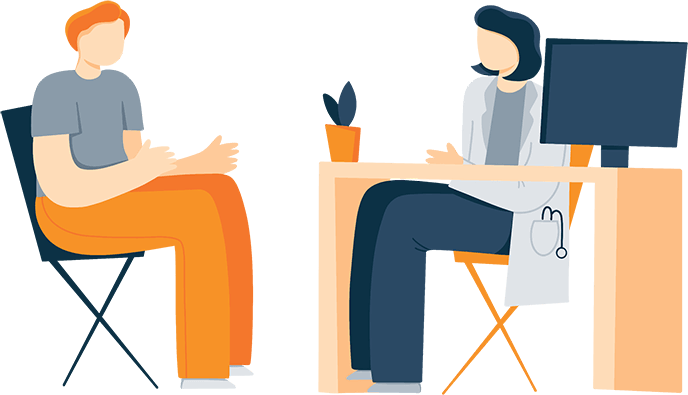
If these weird feelings and head shocks are a nightly occurrence and they're affecting your ability to sleep, talk with your physician. There could be an underlying problem, or you may need to resume taking medication if you've recently stopped a prescription. Working with a licensed psychiatrist if you have a chemical disorder, or your primary care physician, could be the best place to start for more general questions.
Sources and References:
- [1] "Central Sleep Apnea", Mayo Clinic, Mayo Foundation for Medical Education and Research, June 25, 2019
- [2] "Why Do I Feel Like I'm Falling or Twitching As I'm Falling Asleep?" Health Essentials from Cleveland Clinic, September 24, 2020
- [3] "Sleep Disorders and Headache", American Migraine Foundation, March 30, 2021
- [4] "Nocturnal Panic Attacks: What Causes Them?", Mayo Clinic, Mayo Foundation for Medical Education and Research, January 12, 2018
- [5] Gaurav Nigam, et al., "Sleep Related Scratching: A Distinct Parasomnia?", Journal of Clinical Sleep Medicine : JCSM : Official Publication of the American Academy of Sleep Medicine, January, 2016
- [6] "Restless Legs Syndrome, Insomnia And Brain Chemistry: A Tangled Mystery Solved?", Johns Hopkins Medicine
- [7] "Brain Zaps: An Underappreciated Symptom of Antidepressant Discontinuation", The Primary Care Companion for CNS Disorders, U.S. National Library of Medicine
- [8] "Why Lack of Sleep Is Bad For Your Health", NHS Choices
Rachael Gilpin
Rachael is a content writer for Sleep Advisor who loves combining her enthusiasm for writing and wellness. She's had a passion for writing since she was a kid when she wrote awful poetry. She's honed her craft quite a bit since then and considers herself a lucky duck to get paid to do what she loves.
Embracing the remote work life, she occasionally takes her work on the road and lives out her travel writer pipe dream.
In her free time, she attempts to meditate regularly, rides her bike to Trader Joe's, and enjoys trying every type of food that she can get her hands on.

Dr. Lori A. Russell-Chapin L.C.P.C.
Dr. Lori A. Russell-Chapin is a professor in the Masters of Counselling program at Bradley University and writes a monthly blog for "Psychology Today" on various topics, including sleep hygiene and mental health.
Dr. Russell-Chapin is currently a co-director for the Center for Collaborative Brain Research. She practices private counseling part-time and serves as the national chair for the Neurocounseling Interest Network.
She has presented workshops internationally on issues including clinical supervision, neurofeedback, epigenetics, and self-regulation.
Source: https://www.sleepadvisor.org/weird-feeling-when-trying-to-fall-asleep/
0 Response to "Funny Numb Feeling on One Leg at Night"
Post a Comment